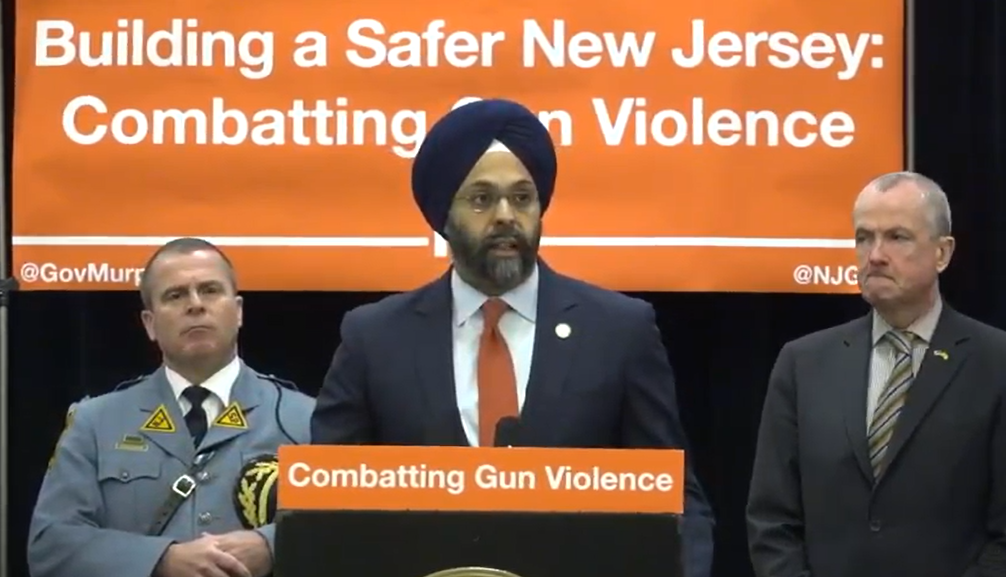AG Grewal to Supreme Court: Federal Civil Rights Law Prohibits Discrimination Based on Sexual Orientation and Gender Identity

AG Grewal to Supreme Court: Federal Civil Rights Law Prohibits
Discrimination Based on Sexual Orientation and Gender Identity
At Issue: Whether Discrimination Based on Sexual Orientation or Gender Identity Is “Sex Discrimination” Under Title VII of the Civil Rights Act
TRENTON -- Attorney General Gurbir S. Grewal today is joining a coalition of attorneys general in urging the U.S. Supreme Court to rule that a federal ban on sex discrimination protects LGBT individuals from discrimination on the basis of their sexual orientation and/or gender identity.
A total of 20 other states are joining an amicus brief to be filed later today by New York and Illinois in connection with three employment discrimination cases before the Supreme Court – Bostock v. Clayton County, Georgia; Altitude Express, Inc. v. Zarda; and R.G. & G.R. Harris Funeral Homes, Inc. v. EEOC.
“Today we are standing up against the Trump Administration’s efforts to undermine the federal civil rights laws that protect members of our LGBT community from unlawful discrimination in the workplace,” said Attorney General Grewal. “Thankfully, New Jersey law bans discrimination on the basis of a person’s sexual orientation or gender identity. But federal law provides an important backstop that we will fight to maintain.”
“While the New Jersey Law Against Discrimination explicitly prohibits discrimination based on sexual orientation and gender identity, many New Jersey residents commute to jobs in other states that lack such protections, so New Jersey has a strong interest in making sure federal law protects LGBT workers from discrimination,” said Rachel Wainer Apter, Director of the New Jersey Division on Civil Rights. “On the merits, the Supreme Court should recognize that discrimination against a person because of the gender they identify as or the gender of the person they love is clearly discrimination based on sex.”
The allegations in the three cases now before the Supreme Court illustrate the kinds of discriminatory treatment that LGBT individuals could face in the workplace without the protection of federal and state civil rights laws.
In Zarda, the plaintiff alleged that he was fired from his job as a skydiving instructor in New York because he did not conform to male stereotypes. The plaintiff in Bostock is a gay man who coordinated child welfare services for a Georgia county’s juvenile court system for ten years until he allegedly was fired after his employer learned of his participation in a gay softball league. And, in R.G. & G.R. Harris Funeral Homes, the plaintiff alleges that she was terminated as the funeral director at a company that operates several funeral homes in Michigan after informing its owner that she intended to transition from male to female and would represent herself as female while at work.
Lower courts reached different conclusions as to how federal civil rights law applies to each case.
The multi-state amicus brief focuses largely on the economic and other harms that unchecked discrimination against LGBT individuals can inflict on states and their residents.
Discrimination against LGBT workers interferes with the ability of states to “foster welcoming communities, promote equality and protect their residents’ dignity, economic security and mental health,” the brief notes. In addition, individuals who are fired from their jobs or who find themselves underemployed because of discrimination may end up relying on public assistance programs to make ends meet. Meanwhile, according to the brief, discrimination against LGBT workers “decreases business productivity and increases health costs, thereby inhibiting economic growth and reducing tax revenues.”
The brief points out that while many states, including New Jersey, have adopted anti-discrimination laws protecting LGBT workers, federal civil rights law serves as a vital tool in the states’ comprehensive anti-discrimination efforts.
“Title VII’s comprehensive, nationwide coverage ensures protection for LGBT workers who are not shielded by state law, and thus would otherwise be vulnerable to discrimination without recourse,” the brief asserts.





